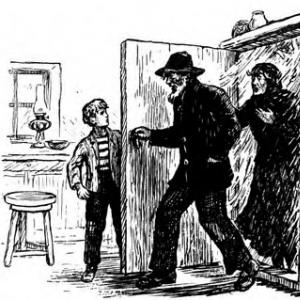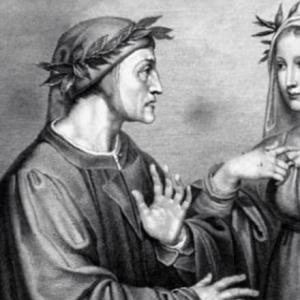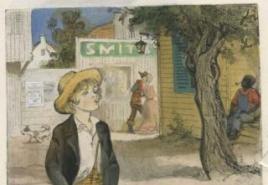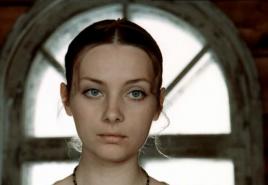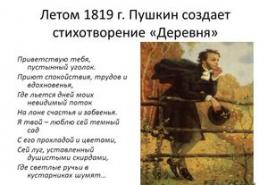Genre of the work of the village of Pushkin. Poem A.S.
The village atmosphere was given to the soul A. S. Pushkin, peacekeeping, at the same time the poet was oppressed by the messenger of the peasants. These mixed feelings were reflected in the poem, which will be discussed in the article. Schoolchildren study it in grade 9. We offer to familiarize yourself with the brief analysis of the "village" according to plan.
Brief analysis
History of creation - Over the poem, the poet began working in 1819 in Mikhailovsky, and completed him in St. Petersburg. Published the village only in 1826, called "Privacy".
Subject poem - Beauty of rustic nature and oppression of the people.
Composition - Analyzed work - a monologue of a lyrical character, which is divided into two parts, contrasting in mood: appeal to rural nature, the story about the messenger of the peasants. The poem consists of five stuff with different number of lines.
Genre - Message with elements of Elegy.
Poetic size - Sixtust Jamb, all types of rhymes are used in the work.
Metaphor – "Sheet calm, works and inspiration"(about the village), "Lono of happiness and forgets", "Mill Millings", "Blizzard ... awarded a violent lotion and work, and property, and the time of the farmer".
Epitts – "Luxury Peters", "Dark Garden", "Fascinated Skirds", "Azure Plains", "Niva Stripes", "Privacy of the Great", "Singness Effective".
History of creation
At the beginning of the XIX century, the peasant question was actively discussed in Russia. The authorities received information about the circumstances of the life of a simple people, the literature was replenished with works that reveal the problem of the oppression of the peasants, and the censorship strengthened oversight. In such conditions, in 1819, a poem of the "Village" appeared.
Alexander Sergeevich began working on the work in Mikhailovsky. His initial version got into the hands of Alexander I. The emperor responded positively about verses and even expressed his gratitude to the young poet. But at that time Pushkin did not publish the "village". In 1825, after the Decembrist uprising, control of censorship increased. The poem had to make edits to printed it. The first part of the text with the adjustments was printed in 1826 called "Privacy". The full text saw the world only in 1829. The name "Village" was used in later publications.
Topic
In the work, the author reveals two topics: a rustic atmosphere and oppression of peasants. Contrast by mood, they are complementary, give each other expressiveness. Both problems are transmitted through the prism of the perception of the lyrical hero.
The first four storage poems are devoted to a rural atmosphere. They depict beautiful landscapes, the emotions of the lyrical "I" are displayed. The hero appeals to the "deserted corner", enjoying him as peacefulness. A man admits that for the sake of these sensations left fun and peers. Here he feels like thoughts themselves are born in his head.
Next, the lyrical hero recreates the driving landscapes. The peculiarity of nature paintings is that with their help "love" to the rustic atmosphere is expressed. Landscape sketches are very colorful. They cover everything: meadows with skirds, lake streams, hills and fields. Larithic hero in the distance, hero sees herd, huts and mills. From nature paintings, the calm is calm, at the same time they are dynamic. In the fourth stanza, the lyrical "I" says that the Lono of Nature is the best place for creativity.
After idyllic paintings, strings appear expressing the oppressed state of the lyrical hero. The thing is that landscapes are only a wonderful shell, whose own - unhappy life of the peasants. Barity allowed to pick up all: work, time, property. Alexander Sergeevich openly says that all this is illegal, violent. In the last rows, the lyrical hero expresses the fact that the people will once be released.
Composition
In the sense, the poem is divided into two parts: the appeal of the lyrical hero to the village, including landscape sketches and the story about the life of the people. The formal composition does not correspond to the semantic. The poem consists of five katrenoes, each of which continues the previous one.
Genre
The product genre is a message with elements of Elegy. The author describes landscapes, binding them with thinking, at the same time the lyrical hero appeals to the village. In the last rows, disappointment and sadness is a poetic size - a six-storey jamb. A. S. Pushkin used all types of rhymes: Cross Avav, Ring AVVA and parallel AAVA.
Means of expressiveness
In the work of the poet uses means of expressiveness. With the help of them, he creates a panoramic painting of the village, transfers emotions, overwhelming the lyrical hero.
In the text are often found metaphor: "Sheet calm, works and inspiration" (about the village), "Lono of happiness and slaughter", "Wilder Mills", "Breath ... awarded a violent lotion and work, and property, and the time of the farmer."
Supplementary landscapes and reflections epithets- "Luxury Peters", "Dark Garden", "Fragrant Skirds", "Azure Plains", "Niva Stripes", "Privacy of the Great", "Pryaistless", "exhausted slaves."
Test by poem
Rating Analysis
Average rating: 4.4. Total ratings received: 97.
It is divided into certain stages. These stages are combined with themes that have emerged at the early time of the formation of a writer. The formation of the artistic consciousness of the Great Poet, playwright and criticism influenced communication with famous writers and Decembrists, as well as Western European literature and Russian folklore.
In contact with
The village of "Village" reflects his inspired reflections of the second creative stage, when he graduated from a lyceum, led an active public and political life and resided in references. During this period, especially acute The writer worried the need to take reforms, which, in his opinion, could affect the changes in the autocratic device of Russia.
Analysis plan
To analyze the poem, it is necessary to adhere to a specific plan, which may include:
- The history of creating a work, its topic and an idea.
- Poetic size.
- Composition.
- Lyrical "I".
- Fine-expressive means.
History of creation
Pushkin from an early age felt injustice. His thoughts and beliefs were often supported by free freedom, communicating with their lyceum friends and gradually folding durable views on life, which were established at the basis of the worldview of the writer. It was mostly recognized by the highest value of freedom. The poet considered the autocratic power of cruel tyranny, and the first unfair obstacle in the life of people - serfdom.
The poem was written in a severe creative period of the poet. In 1819, after the reference, while under house arrest in the village of Mikhailovskoye, in this work he openly declared the serfdom, which converts part of the population of the Great country in slaves.
Its main idea is the need to cancel the serfdom. Pushkin wanted to emphasize the reader's attention to an unfair and cruel attitude towards the people by opposition, dividing the poem as if into two parts. Such a belief of the poet was finally established from communicating with I. S. Turgenev, who was preparing notes for Alexander I on the abolition of serfdom.
Alexander I learned that the people were given the opportunity to read the prohibited poems of the Decembrists and instructed the prince of Vasilchikov to stop the spread of their poems. Adjutant Vasilchikova Chaadayev sent to Alexander I "village" for consideration, but he did not find the preposition to punish the poet and commanded thank Pushkin for bright and good feelings in his work.
 The poem is written in the genre of Elegy, however, in the second part of the work there are elements of civil lyrics. Pushkin describes the landscape of the village of Mikhailovsky (for example, "Lakes ... Plains" - Malenets and Kochan), He fills his creation with feelings and opposes the beauty of a quiet poetic corner "Luxury Pears" in the capital bustle.
The poem is written in the genre of Elegy, however, in the second part of the work there are elements of civil lyrics. Pushkin describes the landscape of the village of Mikhailovsky (for example, "Lakes ... Plains" - Malenets and Kochan), He fills his creation with feelings and opposes the beauty of a quiet poetic corner "Luxury Pears" in the capital bustle.
At first glance, the reader notes positive moments and does not suspect that the picture of patriarchal idyll can be broken. Against the background of the harmony and the magnificence of nature, it is possible to note only the pleasure of his own work of the poet, he is comforted and inspired, creates and rests from unrest and concerns of the city life, showing as the soul of his lyrical hero is open to comprehend the truth.
In the second part of the poem, the author violates the established harmony, and his calm reflection leads him to the thoughts that he was hidden in this picture of the well-being, which he described. Poet and realizesthat idyll is based on lawlessness and the unfair authorities of the landowners, which is an arbitrariness in relation to peasants.
The poem A. S. Pushkin "Village" is written "High Style". Pushkin applies solemn words and expressions ("Oracles of the centuries", "Vinla", "Roptanu"). Special expressiveness is noted in the use of the capital letter, in this way the poet transmits its high value ("Law", "Owner", "Fate").
Pushkin's poetic style changes dramatically, like the rhythm of the poem, as well as the Yam, who previously hesitated (six feet with a pause and more - cesura - further up to five or four stops), and then began to sound completely different (for the "long" line of a six-leaved jamba there are relatively six " short "strings). Line " no thought terrible soul here droishe brings the reader to the thought that idyll carries a different picture of village inhabitants. He suggests that the peasants are not free, and their fate does not belong to them.
The author clearly shows opposition and replaces smooth and tender images in the first part. ("Idle will", "Lono of happiness and slaughter")on vascular and hard images in the second part ( "Thought terrible", "ignorance killing shame"). In addition, in the second part of the poem, poetic formulas change, and not the principle of their use. Among the usual poetic revolutions, a satirical picture of the world is noticeable, which is as conditional as the images of the poet.
Structural analysis of the work allows you to concludethat the next literary technique is applicable:
- Sixtust Jamb, which alternates with a four-stranded yamb;
- Men's rhyme in the 1st and 3rd lines alternate with the female rhyme in the 2nd and 4th lines;
- There are visually expressive drugs;
- Artistic means are reflected in the contradictory parts of the poem.
Lyrical hero
 In the first part of the work of A. S. Pushkin "Village" The lyrical hero is a romantic, he has a finely organized soul and a pronounced ability to feel the magnificence of life, in the second part - reflects the lyrical "I", where the poet is being transformed sharply and romantic becomes a politician, Understanding the shortcomings of the monarchist building of the native country. It is quite noteworthy and the image of the landowners: "Blizzard wild, without feeling, without law ..."who live at the expense "Slavery Skinny".
In the first part of the work of A. S. Pushkin "Village" The lyrical hero is a romantic, he has a finely organized soul and a pronounced ability to feel the magnificence of life, in the second part - reflects the lyrical "I", where the poet is being transformed sharply and romantic becomes a politician, Understanding the shortcomings of the monarchist building of the native country. It is quite noteworthy and the image of the landowners: "Blizzard wild, without feeling, without law ..."who live at the expense "Slavery Skinny".
The hero of the work deeply regrets that he is unable "Hearts alarming",therefore, no way can affect the arbitrariness in the country . His dream is to look at "Issue Freedom" so that the landowners stop satisfying "And property, and the time of the farmer."
Poems size and composition
 The work of A. S. Pushkin "Village" is represented by readers in the form of a speech performance. The author expresses not only his ideas and thoughts, but also the opinion of progressive people. The story begins with the description of idyll and appeal to rustic beauties, which corresponds to speech speech. Thoughts in the selected poet style are equally built by the second and third stanza. The same technique is also used in the second part of the poem.
The work of A. S. Pushkin "Village" is represented by readers in the form of a speech performance. The author expresses not only his ideas and thoughts, but also the opinion of progressive people. The story begins with the description of idyll and appeal to rustic beauties, which corresponds to speech speech. Thoughts in the selected poet style are equally built by the second and third stanza. The same technique is also used in the second part of the poem.
The presence of question and exclamation purposes is also determined by a spectrum style. The author of no accident applied such a composite construction: the "village" poem is a call not only in the content, but also in the form. It can be said that Pushkin opened openly with the requirement to eliminate the centuries that arise back injustice.
The poem "Village" caused anger and discontent of the government. After all, it is in him the great Russian poet refuses the Barly Wilderness, which has turned the life of ordinary people to the "painful jar". But it is their works and that beautiful painting is built, which is described in the first part of the poem.
History of creation
Analysis of the "Village" Pushkin Schoolboy can start with the history of creating a work. It was written in 1819. When the young poet after release from the lyceum received the position of college secretary in St. Petersburg, he did not even suspect that Alexander I himself would be glad to send him to Siberia, and maybe even at Solovetsky Islands. Only thanks to the petition of close friends of the poet - V. Zhukovsky, A. Karamzin, A. Turgenev - the sentence was decided to replace the reference to the south of Russia.

Dissatisfaction of the king
What caused the anger of the king, who defeated the Napoleonic army and in honor of which he stood on the Palace Square, was heated by the glory "Alexandria Pipple"? The reason was the winsted works of the poet. The king somehow even reproached the then head of the Lyceum E. A. Engelgardt for the fact that his graduate "flooded Russia with his outrageous works." Pushkin was not a member of not a single secret society, which then there were many. After all, for this he had too unpredictable and hot-tempered. However, it turned out that just for one poem, in which the Great Russian poet freely expressed his thoughts, he was exiled south. After all, this particular work was impregnated with hopes for the fact that the country can expect great reforms.

What did the poet objit
At that time, the poet worked on the creation of the poem "Ruslan and Lyudmila", which he began during his training in the Tsarskoyel Lyceum. But, finally, being on freedom after six years of study, the poet begins to write about the "liberty of the Holy". And its first work belonging to the genre of ODY, he called "liberty". In it, he condemned Tiranans who neglect the laws. And in the work of the "village", which was written after two years, the great Russian poet angry condemns the serfdom.
Continuing the analysis of the "Village" Pushkin, it can be indicated that this work is a socio-political monologue. It affects the social problems that the author deeply worried. In terms of his beliefs, Pushkin was a supporter of the constitutional monarchy, while he reigned the serfdom, pointing out that the liberation of people should have occurred by the ruler. During the lifetime of the poet, only the first part of the work was printed. The second applied only in the lists. Overall, the poem was published by Herzen abroad in 1856, and in Russia - in the 1870s.

Artistic means
Making a literary analysis of the "Village" Pushkin, a student for a good assessment can be described and those artists who used the poet. A large role in the poem is played by opposition, antonymic images, for example, "Blizzard Wild" - "Tight Yar". The poet includes a work and exclamation, which are peculiar to the genre of ODA, as well as rhetorical issues. Such techniques are usually used in the journalistic style of pamphlet. We see that in the "village" Pushkin means of expressiveness uses a variety of. Also, the special sound of the product gives its size - a six-power Yamb. In a different way, it is called "Alexandrian Verse" and is often used in the sides.

Sublime and accusatory work
The work of Pushkin is full of accusatory pathos, Old Slavic terms, as well as antique images (the influence of classicism) is affected. Much in it and solemn, high-speed turns. After the first part of the work was published, the emperor Alexander I ordered gratitude to the poet, and after the spread of the second - Sophisticated the great poet to the south of Russia. Conding the analysis of the village of Pushkin, it is possible to mention one of the most interesting features of the poem. This is his composition - the poet uses the reception of genre offset. The first part is more like a sentimental pastoral, the second closer to the political pamphlet.

Idyllic place
At the beginning of the poem "Village" Pushkin, the reader is immersed in the idyllic picture of the village. The first stains undoubtedly include idyllic landscape lyrics. Here are paintings that are drawn by the poet, breathe beauty and tranquility. He writes that in this area lives completely different moral values. And for the great Russian poet in particular, it is important that in the village he has the opportunity to create. Most of the images mentioned in the first part of the Village Pushkin's poem are romanticized. This is a "dark garden", "Niva strzi".
The village for the poet is the place of silence and tranquility. Here he finally acquires spiritual freedom. Epitts in the "Village" Pushkin create a picture of pacification. This quiet corner is much more expensive to the poet than the "vicious courtyard of the circus", or, for example, "Luxury Peters". The lyrical hero is sure that he will find peace in creativity in this idyllic place, but his dreams were not realized. The intonation of the first part of the work is calm, friendly. The poet is carefully engaged in the selection of epithets that use in large quantities. This helps him pass the picture of a rustic landscape.

Barsky arbitrariness
Sometimes, as a homework, a schoolboy is given a question that Pushkin is opposed to in the "Village". Humanistic ideals of the poet are opposed to the painting of cruelty and slavery. Reception of antithesis is used here. Reality destroyed all his Duma about calm in the village. A completely different color has the second part of the work. She was not missed by censorship, and instead of her the poet had to put four lines of dots. In it, Alexander Sergeevich mercilessly refuses those who were the ruler of people to death.
Antithesis
This composite reception is the contrast between the first part of the work and the final - is intended to have a great impact on the reader. And with his help, the poet succeeds even more to strengthen the impression of the implanting image of tyranny, which does not give people to live freely, to embody their vital aspirations.
The pictures of this arbitrariness are terrified by the fact that anyone could be on the site of the fortress, which in a gravitant work losing the human appearance. With the help of his poetic gift, Pushkin masterfully depicts the images "Bar", and it makes it indirectly - the reader sees what the life of a serf peasant is turning due to this arbitrariness. The main definitions that are given by the poet in the second part is the Barity of Wild, "Barry Skinny." With their help, it becomes a clear theme of the "village" Pushkin - injustice of the serfdom.
Poet citizen
And the poet dreamer turns into a worthy citizen - he now speaks not on behalf of a private person, but from the entire advanced society, which seeks to provide freedom to the people from serfs. The great Russian poet understands that everything in the country solves the ruler. And he hopes that someday this slavery will be canceled on the "Tsar", and in the end, for the Russian state, a fundamentally new era will finally come over the "Fatherland of Enlightened Freedom", when the oppressed person will receive his rights, and will no longer be Must give his life to the altar of the life landscaping of spoiled and cruel landlords.
We looked at the history of the creation of the village of Pushkin, the features of this work that created so many difficulties for the poet, but the way it served for him to express his opinion on injustice. In the work, the poet does not give a response, as it should be struggling with injustice. The mood of the storytellor cannot be called Bunlet. Its the inner world is rich, but in it the reader can also see those concepts that are for the lyrical hero the most valuable - this is the following truth, peace, freedom, creativity.
Greetings, deserted corner, shelter calm, works and inspiration, where the days of my invisible stream fall on the bud of happiness and caress. I am yours: I exchanged the vicious courtyard of the circus, luxurious feasts, fun, overgrowing to the peaceful noise of Dubrov, on the silence of the fields, on the idleness of the free, girlfriend, thinking. I am yours: I love this dark garden with its cool and flowers, this meadow, stirred by fragrant skirds, where light streams in shrubs are noisy. Everywhere I see the moving pictures: here I see two lakes azure plains, where the rift sail whites sometimes, behind them a row of hills and the Niva striped, away the scattered huts, on wet shores wandering herds, smokers and crystal mills; Everywhere traces of contentment and labor ... I am here, from the fumes liberated, we study in the truth of bliss to find, the free soul to immortalize, Roptanya did not listen to the crowd of the crowd, to respond to a shy plenty of Moluba and wonder the fate of the villain il fool - in the greatness of the wrongness. Oracles of the centuries, here I ask you! In solitude, the magnifies is heard your express voice. He chas the laziness of the sullen sullen, it gives rise to me in me in me, and your creative dooms in the spiritual view of the depth. But the thought of the terrible soul is dumbfounded here: Among the blooming Niv and the mountains of mankind, the murderous shame is unforgettable everywhere. Without seeing tears, not a moan, the wedding of the people chosen by the fate, here barbecia Wild, without feeling, without the law, assigned to itself a violent lotion and work, and property, and the time of the farmer. Leaning on an alien plow, conquering a beat, here Slavery is kept in the brazdes of the inexorable owner. Here, a painful jar to the coffin, everyone is enthusiating, hopes and inconsistencies in the soul do not dare, here the Virgo young bloom for the whims of an insensible villain. The support is cute aging fathers, young sons, comrades of works, from the hut native to multiply the yard crowd of exhausted slaves. Oh, if my voice was able to disturb my heart! Well in my chest, my chest is burning at the boat and does not give me the fate of the vitality of the Terrible Dar? I will see about friends! The people of unsentful and slavery, fallen in the mania of the king, and the Fatherland of Freedom of Enlightened is finally the beautiful dawn?
Creation date: July 1819
Analysis of the poem of Pushkin "Village"
In 1819, the 20-year-old Pushkin arrived for a short time of their St. Petersburg to his family estate Mikhailovskoye. It was here that his famous poem "Village" was written here, in which the author analyzes not only his own life, but also gives an assessment of socio-political events that occur in Russia.
The poem "Village" was created in the form of Elegy, but its measured rhythm, setting up to the philosophical way, is very deceptive. If the poet in the first part of the work is recognized in love for his homeland, emphasizing that it was in Mikhailovsky, he was once serenely happy, then in the second part "The thoughts terrible the soul overshadows here."
Such a pessimistic mood of Pushkin is explained simply enough. A still teenager poet repeatedly thought about how the world was imperfectly and unfair. People who are forced to work on Earth to night in the morning, vague Nishchenskoe existence. And those who are used to spending their days in idle passion, do not refuse themselves. However, more clearly, these thoughts were formed at the poet later, when in St. Petersburg, he had quite closely descended with future Decembrists, imbued with the ideas of fraternity and equality at that time. That is why in the first lines of the village of Village, the poet, as if by chance, mentions that he "traded the vicious courtyard of the Czyrcy" on the "Mirny noise of Dubrov, on the silence of fields." This opposition is used by the author by no means accidentally. Pushkin, referring to his native land, admits: "I'm yours." He identifies himself not with the highest light, from which, in essence, his fate and a brilliant future depends, and with ordinary peasants who, according to the spirit, the poet is much closer and clearer than the counts and princes, who believe that the world is ruled solely money. Therefore, returning to Mikhailovskoye, Pushkin notes that "I am here, from the fumes liberated, we study in the truth of bliss to find."
Nevertheless, the active and stormy nature of the poet can not long enjoy the peace and tranquility of rural life while the world rolls into the abyss. The poet oppresses the fact that the people of His Circle prefers not to notice the poverty and the mission of life of the fortress peasants and do not consider them for people. Against the background of tears and the sufferings of thousands of oppressed reigns "Barness wild, without feeling, without the law", thanks to which the work of slaves assign others. And at the same time they believe that it is quite fair, because they are almost the gods who came to this life solely in order to receive all imaginable and inconceivable pleasures.
In contrast to "owners of life", the poet is very figuratively and Emko will reproduce the life of those who drag on themselves "painful jar to the coffin." These people are alien to such concepts as justice and freedom, as they do not know that this, in principle, possibly. After all, the impact of the centuries "Here the Virgin young color for the whims of the insensitive villains", and the young men who should become a reliable support of their fathers, "go to multiply the yard crowds of exhausted slaves."
Turning to his people, clogged and oppressed, the poet dreams that his voice "knew how to disturb the heart." Then the author could change the world to the best and restore justice to his poems. However, Pushkin understands what to do this, even possessing a huge poetic gift, almost impossible. Therefore, in the last lines of poems, the poet is asked if he will see "slavery who fell in the mania of the king." Pushkin still believes in the inviolability of autocracy and hopes that the sensitiveness of the Augustic parties will be able to put an end to the suffering of hundreds of thousands of Russian fortresses, which, by the will of fate, were born slaves.
Alexander Sergeevich Pushkin's loyal love to his homeland is reflected in many lyrical works. The poet for a long time for a long time in Mikhailovsky, with whom joy, longing, long expulsion from the capital are connected. Here, in July 1819, he wrote OED "Village". Deeds to the problems of serfdom, she talks about the serious peasant labor and the luxurious life of the rich. Making an analysis of the poem can noted the statements of the great poet about despotic autocracy, inhuman serfdom ("... here is wild"). The subject of the poem bears the influence of the views of the Decembrists, friendly conversations with Chaadaev, communication with the Ryleev. The poet is worried about the issues of the social structure of Russia.
Creating a work is associated with an important milestone in the life of the poet. This period of Creativity Pushkin is called Petersburg. The poet actively participates in public life, meets participants in closed societies. Thinking about the problems of serfdom. The poet sees that most people have his surroundings, there is still no desire to notice, in what poverty there are peasants. The work of serfs use landlords, considering it fair. Pushkin talks about those poor people who do not know the feeling of freedom and justice. The poet managed for a long time to come to the estate Mikhailovskoye. Rustic life attracts him. Pushkina likes rural loneliness, he is breathing more quickly and live. In the estate of the poet and wrote the famous Elegy "Village".
The topic and idea of \u200b\u200bthe poem of Pushkin "Village" from simply landscape develop into the theme of political. The work is dedicated to the topics of completeness at that time. The poet shows his disadvantage, cruelty and injustice towards ordinary people. The poem consists of two important topics. In the first, the author is recognized in love for native places, and the second sounds a political declaration, a dying soul and configuring to the philosophical way. Describing the rustic life, the calm beauty of nature, the author speaks of inspiration, about literary creativity and spiritual cleansing. The second part is abruptly opposed to everything, which the poet said at the beginning. Speaks against autocracy, his despotism, cruelty ("The thought of terrible soul is crushed here). The work is complex on the composition. The poetic size is a six-color yum, a different rhyme. There is a ring and cross rhyme.
The genre of poem is unusual. In Ode "Village" the poet connected political satire with the genre of Elegy. In the first part, quiet paintings were created, around the "wilderness of privacy", "deserted corner" and others. This rural landscape has poetry. Here she is shelter, harmony. Minutes of inspiration come. It is very poetic "shelter tranquility", a sensitive beautiful nature. Unexpectedly, the work varies by tone and content. A poet who moved to the village does not find peace, he notices around poverty, troubles and their cause calls "Slavery Skinny". By opposition, thoughts about the light dawn are born, which should take away over the expanses of the Fatherland. The young poet calls the king to the destruction of slavery and the presentation of the people of freedom and enlightenment. The author reflects on injustice that reigning around, dreams of time when it disappears. Will it see Pushkin himself? Can people become free? Speaking with the people, who is depressed, the poet wants his voice to be "able to disturb the heart." Having achieved this, the author will be able to make the world better than the poetic line, just. But this is impossible. The last lines suggest that the poet hopes for the August person, which will put an end to human suffering.

